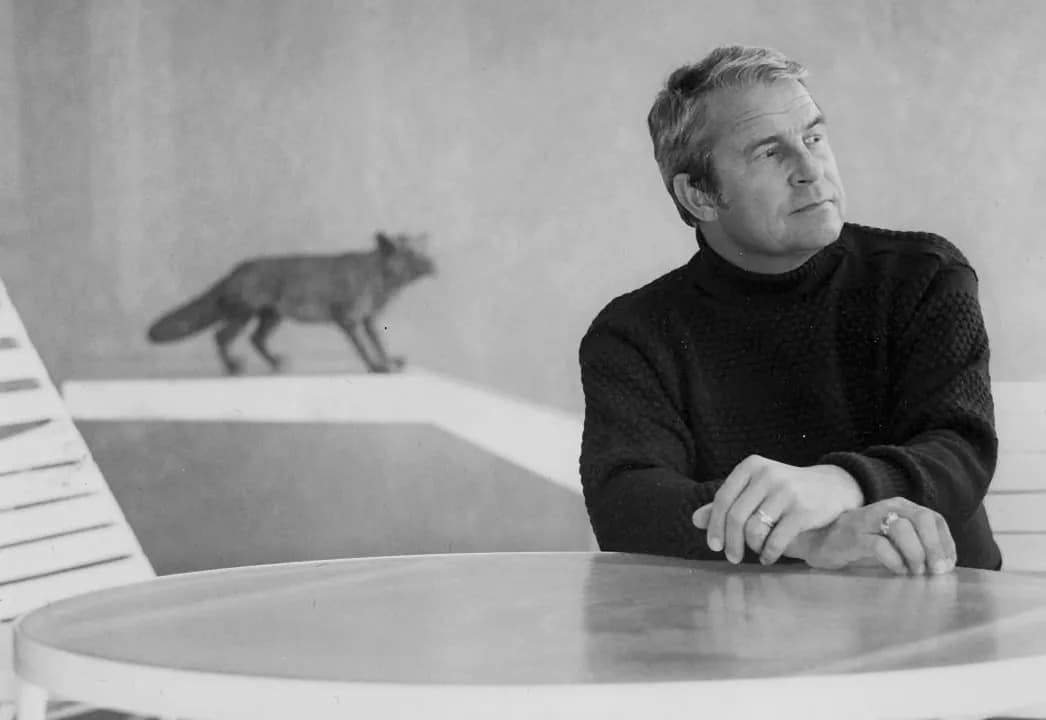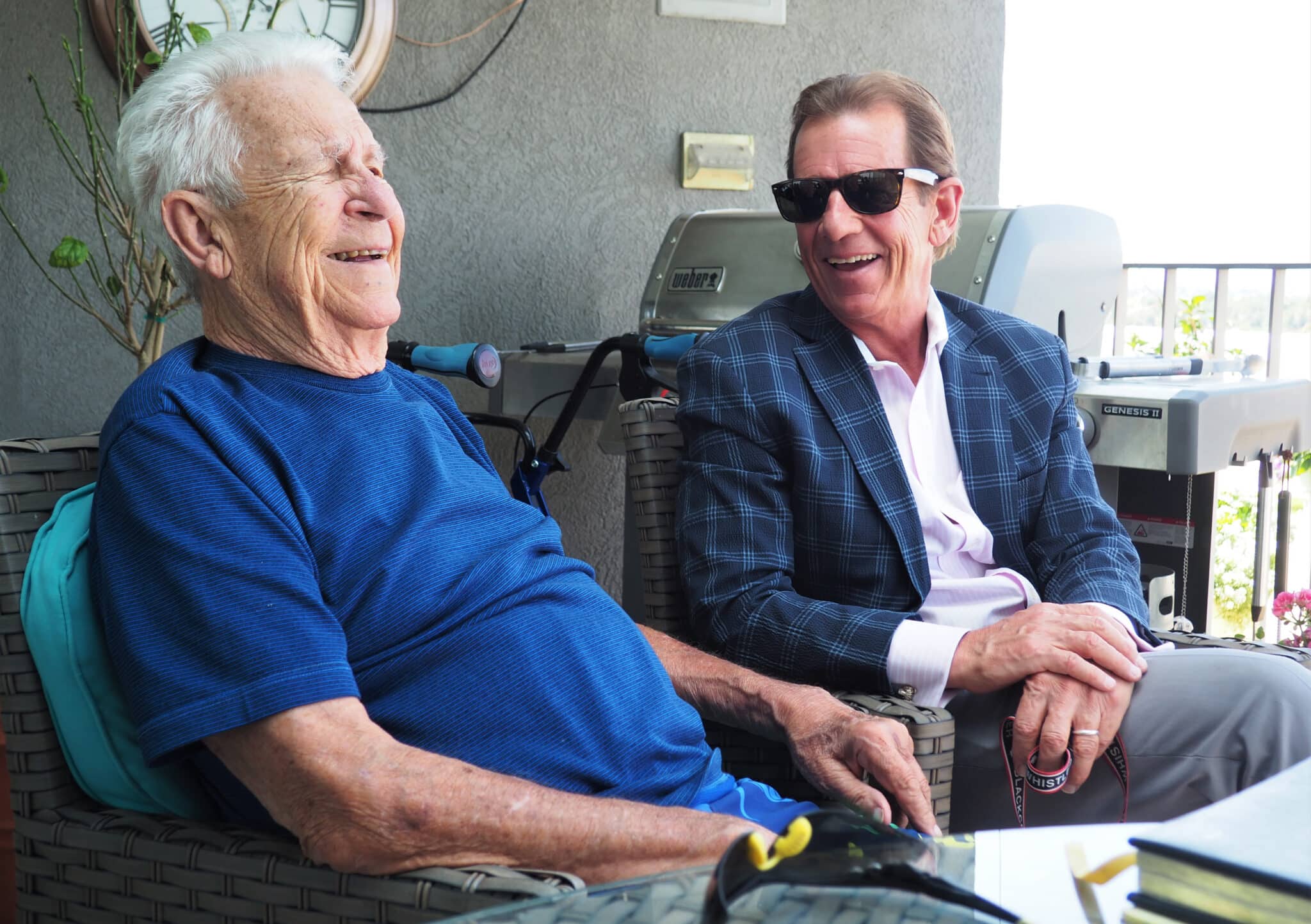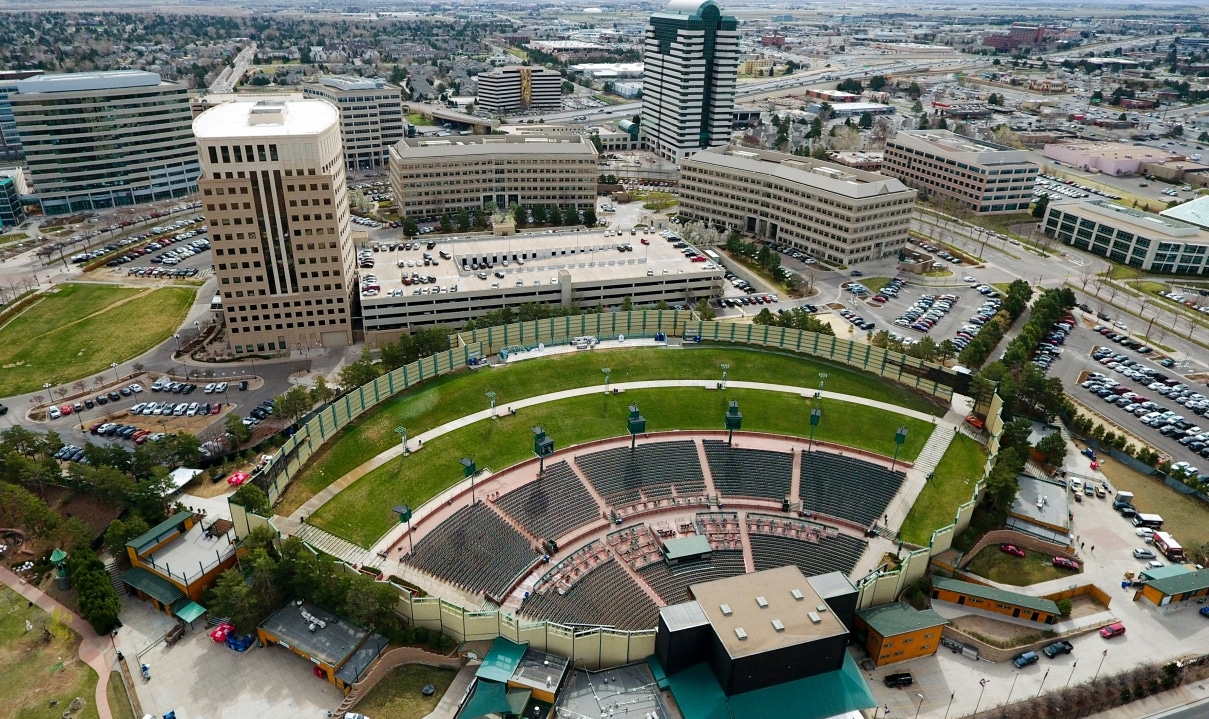
John Madden Jr., a major developer in the Denver Tech Center, died Jan. 19 at 94. His company built 10 million square feet of office and mixed-use space in its 60-plus-years history. (Photo provided by the Museum of Outdoor Arts)
Longtime developer John Madden Jr., whose emphasis on art and landscaping produced some of the more distinctive buildings in the Denver Tech Center, died last week. He was 94.
Madden, born and raised in Omaha, Nebraska., started in the family insurance business and then carved out his own path in commercial real estate. Working with his family, he built a major art collection, and indoor and outdoor museums to display art, sculptures and landscapes in the Denver area, where he moved his development company in the 1970s.
The John Madden Co. built more than 10 million square feet of office and mixed-use space in its 60-plus-years history.
“He had a grand life,” his daughter, Cynthia Madden Leitner, said.
His family said Madden died from natural causes Friday, Jan. 19 at his home in Greenwood Village. The southeast Denver area was where he made his mark in Colorado. After work on projects in Omaha, Detroit, Iowa and California, Madden moved his company to the Denver area.
Son J. Madden described his father as “an entrepreneurial free spirit” who believed Denver would present more opportunities. His father looked at a couple of sites in downtown Denver and in Greenwood Village. The area that would become the site of a premier business park was farm land then.
“Greenwood Village was just a hamlet outpost along (Interstate 25). Orchard Road didn’t exist. Belleview was two simple asphalt lanes. Arapahoe Road didn’t exist,” Madden said. “It was really an open frontier and land was inexpensive.”
With the relocation of the Johns Manville Co. from New York to Denver in the early 1970s, the Denver Technological Center became “a formidable competitor for big companies,” Madden said.
Along with DTC founder George Wallace, the elder Madden helped shape the growth of the south-metro area and the business park, which started on 40 acres in south Denver and Greenwood Village. The center is now about 900 acres and home to more than 1,000 companies, according to Shea Properties.
“George Wallace was on the east side of I-25 and John Madden was on the west side of I-25,” Madden said.
The John Madden Co.’s buildings included the Palazzo Verdi Office Tower, which features stone interior finishes and the Madden Museum of Art. The artwork in the lobby atrium includes a hand-carved replica of the labyrinth from the Chartres Cathedral in France.
Other projects were Harlequin Plaza and Fiddler’s Green Amphitheatre.

John W. Madden Jr., left, talks with broker Phil Ruschmeyer in 2021. (BusinessDen file)
Madden Leitner said her father believed art should always be part of a project. “A lot of times, the art was actually the landscape and the hardscape of the building, not to mention the building,” she said.
Fiddler’s Green, the scene of concerts in the summer, was designed as an earth sculpture that could accommodate performances, Madden Leitner said. Her father worked with his wife, Marjorie Putt Madden, and Madden Leitner on Fiddler’s Green and the Museum of Outdoor Arts, which owns the amphitheater and works with Anschutz Entertainment Group to book the 18,000-seat venue.
Madden teamed with his son, J. Madden, to develop Club Greenwood, an athletic club in Greenwood Village.
“Our dad liked to involve family, extended family and friends in everything he did. He loved to collaborate in whatever he created,” Madden Leitner said.
Her parents traveled a great deal and made several trips to Italy to find and buy materials for the buildings, Madden Leitner said. “They were a progressive example of a husband-and-wife team. Mom was right there, helping to buy art, the finishings. They had a great time doing things like that, especially in Italy.”
J. Madden said the siblings plan to take some of their father’s ashes and “deposit them in one of his favorite places” in Italy.
“It’s sort of a romantic gesture that we feel our dad would have really liked,” Madden Leitner said.
In 2016, the Maddens gave 133 works of art from their private collection to the University of Denver. The collection, valued at $10 million, is in the Madden Museum of Art and includes works by 19th Century European artists as well as pieces by American and contemporary artists. University officials said Madden’s gift allows students to learn as they curate and care for the artwork, and has supported graduate students with funds to pursue a master’s degree.
“John Madden’s generosity to the College of Arts, Humanities & Social Sciences has been immense,” Rhonda M. Gonzales, dean of the college, said in a statement. “He realized his vision for a world-class art collection to the benefit of the Denver community, and particularly our DU students.”

Fiddler’s Green Amphitheatre in Greenwood Village is seen from the air in 2018. Immediately behind the venue, from left to right, are the Palazzo Verdi building and Fiddler’s Green I and II. (RJ Sangosti/The Denver Post)
Supporting education was important to Madden, his family said. He donated to Junior Achievement Rocky Mountain, the Boy Scouts of America and other educational programs.
The developer also established the Madden Challenge at DU’s Daniels College of Business, which provides seed money for student entrepreneurs. The university said the program has contributed $145,000 to 420 students over more than a decade of competition,
Madden was preceded in death by his wife, Marjorie, who died in 2014. Survivors include his three children, Madden Leitner, Scott Madden and J. Madden; grandchildren, Schuyler Madden, Blair Madden Bliss, Paul Leitner, Joseph Madden and Grace Madden; four great-grandchildren, Schuyler Madden, Lily Brown, Walter Madden and Willow Bliss; sisters Jane Crosby and Susan Madden Lankford.
Memorial information wasn’t immediately available.
This story was originally published by The Denver Post, a BusinessDen news partner.

John Madden Jr., a major developer in the Denver Tech Center, died Jan. 19 at 94. His company built 10 million square feet of office and mixed-use space in its 60-plus-years history. (Photo provided by the Museum of Outdoor Arts)
Longtime developer John Madden Jr., whose emphasis on art and landscaping produced some of the more distinctive buildings in the Denver Tech Center, died last week. He was 94.
Madden, born and raised in Omaha, Nebraska., started in the family insurance business and then carved out his own path in commercial real estate. Working with his family, he built a major art collection, and indoor and outdoor museums to display art, sculptures and landscapes in the Denver area, where he moved his development company in the 1970s.
The John Madden Co. built more than 10 million square feet of office and mixed-use space in its 60-plus-years history.
“He had a grand life,” his daughter, Cynthia Madden Leitner, said.
His family said Madden died from natural causes Friday, Jan. 19 at his home in Greenwood Village. The southeast Denver area was where he made his mark in Colorado. After work on projects in Omaha, Detroit, Iowa and California, Madden moved his company to the Denver area.
Son J. Madden described his father as “an entrepreneurial free spirit” who believed Denver would present more opportunities. His father looked at a couple of sites in downtown Denver and in Greenwood Village. The area that would become the site of a premier business park was farm land then.
“Greenwood Village was just a hamlet outpost along (Interstate 25). Orchard Road didn’t exist. Belleview was two simple asphalt lanes. Arapahoe Road didn’t exist,” Madden said. “It was really an open frontier and land was inexpensive.”
With the relocation of the Johns Manville Co. from New York to Denver in the early 1970s, the Denver Technological Center became “a formidable competitor for big companies,” Madden said.
Along with DTC founder George Wallace, the elder Madden helped shape the growth of the south-metro area and the business park, which started on 40 acres in south Denver and Greenwood Village. The center is now about 900 acres and home to more than 1,000 companies, according to Shea Properties.
“George Wallace was on the east side of I-25 and John Madden was on the west side of I-25,” Madden said.
The John Madden Co.’s buildings included the Palazzo Verdi Office Tower, which features stone interior finishes and the Madden Museum of Art. The artwork in the lobby atrium includes a hand-carved replica of the labyrinth from the Chartres Cathedral in France.
Other projects were Harlequin Plaza and Fiddler’s Green Amphitheatre.

John W. Madden Jr., left, talks with broker Phil Ruschmeyer in 2021. (BusinessDen file)
Madden Leitner said her father believed art should always be part of a project. “A lot of times, the art was actually the landscape and the hardscape of the building, not to mention the building,” she said.
Fiddler’s Green, the scene of concerts in the summer, was designed as an earth sculpture that could accommodate performances, Madden Leitner said. Her father worked with his wife, Marjorie Putt Madden, and Madden Leitner on Fiddler’s Green and the Museum of Outdoor Arts, which owns the amphitheater and works with Anschutz Entertainment Group to book the 18,000-seat venue.
Madden teamed with his son, J. Madden, to develop Club Greenwood, an athletic club in Greenwood Village.
“Our dad liked to involve family, extended family and friends in everything he did. He loved to collaborate in whatever he created,” Madden Leitner said.
Her parents traveled a great deal and made several trips to Italy to find and buy materials for the buildings, Madden Leitner said. “They were a progressive example of a husband-and-wife team. Mom was right there, helping to buy art, the finishings. They had a great time doing things like that, especially in Italy.”
J. Madden said the siblings plan to take some of their father’s ashes and “deposit them in one of his favorite places” in Italy.
“It’s sort of a romantic gesture that we feel our dad would have really liked,” Madden Leitner said.
In 2016, the Maddens gave 133 works of art from their private collection to the University of Denver. The collection, valued at $10 million, is in the Madden Museum of Art and includes works by 19th Century European artists as well as pieces by American and contemporary artists. University officials said Madden’s gift allows students to learn as they curate and care for the artwork, and has supported graduate students with funds to pursue a master’s degree.
“John Madden’s generosity to the College of Arts, Humanities & Social Sciences has been immense,” Rhonda M. Gonzales, dean of the college, said in a statement. “He realized his vision for a world-class art collection to the benefit of the Denver community, and particularly our DU students.”

Fiddler’s Green Amphitheatre in Greenwood Village is seen from the air in 2018. Immediately behind the venue, from left to right, are the Palazzo Verdi building and Fiddler’s Green I and II. (RJ Sangosti/The Denver Post)
Supporting education was important to Madden, his family said. He donated to Junior Achievement Rocky Mountain, the Boy Scouts of America and other educational programs.
The developer also established the Madden Challenge at DU’s Daniels College of Business, which provides seed money for student entrepreneurs. The university said the program has contributed $145,000 to 420 students over more than a decade of competition,
Madden was preceded in death by his wife, Marjorie, who died in 2014. Survivors include his three children, Madden Leitner, Scott Madden and J. Madden; grandchildren, Schuyler Madden, Blair Madden Bliss, Paul Leitner, Joseph Madden and Grace Madden; four great-grandchildren, Schuyler Madden, Lily Brown, Walter Madden and Willow Bliss; sisters Jane Crosby and Susan Madden Lankford.
Memorial information wasn’t immediately available.
This story was originally published by The Denver Post, a BusinessDen news partner.
